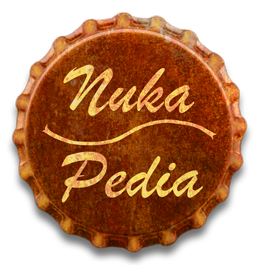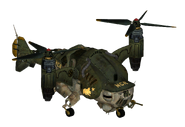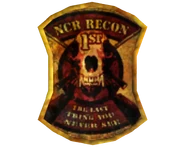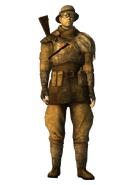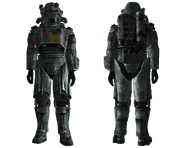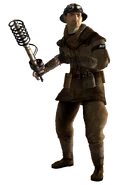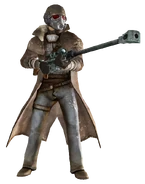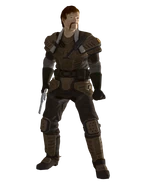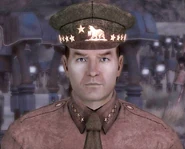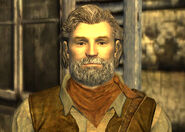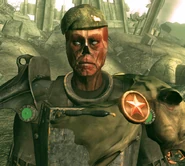 Part of a series on the |
| New California Republic |
|---|
| Government |
|
Senate · Council and President · Judiciary Office of Science and Industry · Republic Reserve |
| States and territories |
| Shady · Los Angeles · Hub · Maxson · Dayglow |
| Military |
|
NCR Army · NCR Rangers Brotherhood War · Mojave Campaign (First Battle of Hoover Dam, Second Battle of Hoover Dam) |
| Politics |
| Republican Farmer's Committee · Stockmen's Association · Agri- and Brahmin barons |
| Economy |
| NCR dollar · Crimson Caravan · Gun Runners · Far Go Traders · Van Graffs |
| History |
| Thaler Act · New Vegas Treaty |
| Lists |
| Characters · Conflicts |
The New California Republic Army (often abbreviated as NCRA) is the standing army of the New California Republic and one of the largest military forces in the wasteland.[2] Its reputation and ability were forged in the constant conflicts with raiders such as the Great Khans and Fiends, as well as conflicts with established polities, like the Enclave, Brotherhood of Steel, and Caesar's Legion.
Background[]
The origins of the army are not detailed, but by 2241 it was the largest standing army in New California, composed of several divisions, including special (mechanized) cavalry and other mechanized units. The New California Republic Rangers, originally an independent paramilitary force, were incorporated into the military in subsequent decades, becoming an indispensable element of its operations. Until the containment operations against the Enclave at Navarro, following the destruction of their headquarters, the Army's primary foes were raiders, such as the Fiends, Vipers, and Great Khans. Decades of fighting an asymmetric war against them turned the Army into a powerful instrument of foreign policy. The Army has continued to grow and serve NCR's interests, securing its expansion and protecting territories under its control. Following the death of President Tandi, it has also became an instrument of expansion, further developing its numbers. In 2253, the retaliatory Pacification of the Mojave was carried out by an overwhelming force of three battalions, in a protracted war that lasted seventeen years. Soldiers of the army distinguished themselves, including future President Aaron Kimball.[3]
Other notable campaigns that shaped the modern NCR Army were the removal of long-standing raider tribes such as the Vipers and the Jackals at Owen's Lake in 2269, the Brotherhood War that raged from the late 2250s/early 2260s for over two decades, and the confrontation at Hoover Dam in 2277, commonly known as the First Battle of Hoover Dam.[4]
By 2281, the NCRA was the single largest military force in the wasteland, rivaled only by Caesar's Legion. Organized into regular Army divisions and battalions,[5] specialist units like a sharpshooter-skirmisher battalion, and additional Ranger battalions,[6] the NCRA has thousands of troops at its disposal, enough to absorb the continued loss of one thousand troops each year in the Mojave Campaign alone and still retain operational capability.[7] However, the effectiveness of its operations was hampered by the influence of brahmin barons. Although they only had one vote at the ballot box, their wealth made it easy for them to influence decision makers to protect their interests at the expense of the general population or ongoing military operation's: Heavy infantry units, soldiers with normal and salvaged power armor suits, were deployed on the home front to protect the barons' ranches from small-time raiders, while rank-and-file troops are sent to the Mojave to maintain the occupation, often without proper service rifles or body armor.[8]
The ongoing occupation of the Mojave coupled with Legion's deliberate lack of activity resulted in negligence. The quality of training among soldiers deployed to the theater deteriorate: Replacements are shipped out with merely two weeks of training, just to maintain the occupation, with these poorly trained conscripts routinely subjected to harsh disciplinary measures, rather than competent command.[9] As a result, when the Legion launched operations to secure beachheads on the western bank of the Colorado River to pave the way for the Second Battle of Hoover Dam, the occupation forces had few resources with which to respond, leading to the Searchlight Sabotage, and the subsequent fall of Nelson and the destruction of Nipton. Only in the face of the approaching Battle did Army command finally wrangle enough support to redeploy heavy infantry and veteran Ranger units to the frontline, bolstering the Army presence.[10]
Organization[]
The NCR Army has inherited the general organizational scheme of the pre-War United States Army. The units of organizations are battalions, divided into companies,[5] platoons, and squads.[11] Typically, they are led by a sergeant or other non-commissioned officer.[5] The Mojave Campaign began with the deployment of three battalions of infantry to the desert at the behest of President Wendell Peterson.[3][12] Military bases of the army (typically called camps) are always under the command of a commissioned officer (usually a major, e.g. Polatli or Knight at Camp Forlorn Hope and Mojave Outpost, respectively). Larger field camps are under the command of a colonel (e.g. James Hsu and Cassandra Moore at Camp McCarran and Hoover Dam, respectively). Under the Kimball administration, male military officers have been promoted disproportionately to females.[13]
Chain of command[]
- See also: List of Army servicemen
The Army has inherited the ranks of the pre-War United States military, as well as the division into officers, non-commissioned officers,[14] and enlisted personnel. Advancement can be swift, especially in active combat zones. It usually takes four years for a soldier to reach the rank of captain, but a vacancy may result in an early promotion.[15] Going beyond the call of duty and demonstrating exceptional leadership may also result in accelerated promotion.[16]
- General. The highest rank in the Army, responsible for commanding entire theaters. For example, General Lee Oliver commands the Mojave Campaign.[17][Note 1]
- Colonel.[18] These officers typically command entire portions of the region, delegated by superior officers, and not always neatly delineated. For example, Colonel Cassandra Moore commands the garrison stationed at the Hoover Dam,[19] while James Hsu is responsible for troops in the New Vegas area, operating out of Camp McCarran. Their areas of responsibility overlap and Moore may deal with security threats in areas formally under Hsu's command, like Freeside.[20][21]
- Major.[16] These officers may lead large combat operations (such as the ill-fated Bitter Springs policing action),[22] forward operating bases (eg. Camp Forlorn Hope under Major Polatli),[23] strategic outposts (eg. Mojave Outpost under Major Knight), and special assignments, like relief for refugees[24] or bounty missions.[25]
- Captain.[15]Typically commanding full companies, captains may also assist superior officers in various affairs, such as overseeing logistics (eg. Cpt. Ronald Curtis),[26][15] enforcing discipline among troops (such as Captain Pappas of the military police),[27] and commanding refugee camps (such as Captain Gilles[28] and Captain Parker).[29]
- Lieutenant.[18] Divided into a "full" lieutenant and the junior second lieutenant,[30] officers bearing this rank lead NCR Army units in battle, ranging from specialist squads (such as Lieutenant Gorobets who is in charge of 1st Recon's Alpha Team and other Camp McCarran sniper teams),[31] to entire companies and garrisons (such as Lieutenant Hayes[5] and Lieutenant Haggerty)[32] Lieutenant officers may also be assigned to specific duties, such as policing, internal security, and patrols (such as Lieutenant Boyd[18], Lieutenant Romanowski,[33] or Lieutenant Monroe[34]). Medical officers may also be granted the rank of lieutenant (such as Lieutenant Markland).
Non-commissioned officers are officers who have not chosen to pursue a commission and promotion to higher levels of authority. In the Mojave Campaign, many NCOs are career soldiers, and frequently are on their second tour.[14] Sergeants typically assist commissioned officers, such as their company and platoon commanders, in their duties, including disciplinary action.[9] In some contexts, a sergeant's rank is a formality, bringing with it no extra responsibilities or powers (eg. Sgt. Bitter-Root in Alpha Team).[35]
- Master Sergeant.[30]
- First Sergeant.[36][30]
- Staff Sergeant.[37][30] Aside from assisting officers (including carrying out disciplinary punishments like flogging),[9] staff sergeants may also be responsible for compiling reports.[38]
- Sergeant. Sergeants are the most common non-commissioned officers. Like other grades of sergeants, they assist commissioned officers in the field,[14] and may also be assigned squads to carry out specific assignments, such as establishing forward camps (Sergeant Banner[39]), managing supplies (Sergeant Contreras),[40] or leading squads in combat operations (Sergeant Lee[41]). Some sergeants may exercise authority comparable to a commissioned officer: Sergeant McCredie at Camp Golf leads the Army component of the garrison, in lieu of a lieutenant or captain.[verification needed]
Enlisted ranks form the bulk of the New California Republic Army.
- Technical Sergeant.[42] A high enlisted rank, technical sergeants may be responsible for operation of sensitive equipment and compiling reports, without subordinates (such as Technical Sergeant Reyes).[43]
- Corporal.[30] Senior enlisted troops, corporals are leaders responsible for their squads, ensuring their readiness and executing orders from non-commissioned officers.[44][45] As senior personnel, corporals may also be assigned to positions of special responsibility, such as that of a mess officer (Corporal Farber).[46][47] In some contexts, the rank carries no extra powers, beyond indicating seniority (such as Corporal's Sterling and Betsy).[48]
- Private First Class.[49][50] The rank signifies an experienced enlisted soldier.[30]
- Private.[51] The most basic and most numerous rank in the New California Republic Army. Privates make the bulk of the Army, bearing the brunt of the risk associated with its operations. This is compensated for by Army benefits. While monthly pay is low, a completed tour of duty and honorable discharge entitles a veteran to various Army benefits and makes securing a job easier.[52][53][54] The Army distinguishes between two Private ranks: PVT, the "base" private, and PV2, signifying a trained soldier.[30][verification needed]
Components[]
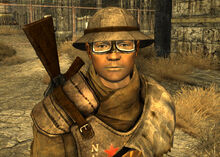
An Army sergeant, with a full set of standard light infantry armor and the service rifle.
The New California Republic's military is predominantly an infantry force, with a number of specialized divisions. Light infantry form the basic component of the Army, relying on large units of troopers deployed against the enemies of the Republic, from raider gangs and mutants to the Brotherhood and the Legion.
The infantry have numerous specialized battalions and units exist, including:
- First Recon, sharpshooters
- Heavy infantry[8] units equipped with salvaged power armor, used as shock troops,[55]
- Medical units, including field medics specializing in battlefield trauma[56][57] and medical doctors for more comprehensive medical care.[58]
- Field Preparations Division, field construction and logistics unit[59]
- NCR Military Police, responsible for law enforcement within the Army and areas remaining under the Army's jurisdiction, such as military bases and the Strip.
- Other logistics and support units, including quartermasters and mechanics.
Rangers[]
Originally an abolitionist paramilitary force under Chief Elise, the Rangers became a part of Republic's military operations by 2271 and the signing of the Ranger Unification Treaty, which extended NCR jurisdiction into southern Nevada. Rangers serve as the Republic's special forces and elite light infantry units, and Army soldiers can voluntarily transfer to the Rangers either at their own initiative or by invitation from Rangers. They are formally separate, using their own ranks and distinctive equipment (such as the patrol armor or the venerated Black armor), but in practice they are folded into the Army's military command. Aside from typical military operations, they are routinely used for tasks outside the purview of the Army, such as internal investigations,[60] or assassinations.
Air force[]
The NCR has limited airpower, with a fleet of captured Vertibirds for special missions (with some of them stationed at border outposts, such as the one on the Long 15), with at least one Vertibird being reserved as the president's personal vehicle ("Bear Force One").[61][62][63][64]
Mechanized units[]
The New California Republic has a mechanized vehicle division, with trucks used to deliver men and materiel. Camp McCarran, as a regional hub, has a repair depot dedicated to their ongoing maintenance and service.[65] The primary limitation for the force is the supply of tires and other degradable parts that greatly limit the possibility for fielding any larger scale vehicle fleet.[Non-game 1][Non-game 2]
Personnel[]
The Army has an eligible age of 16 for military service, although volunteers this young are rare. Competence is rewarded with swift promotion, and exceptional soldiers can reach officer ranks within a year.[66] Volunteers already in the service may elect to transfer to the NCR Rangers[Non-game 3] or even be invited to join.[66]
However, despite the prospects, the Army draws most of its manpower from NCR states through conscription. A majority of the troopers, especially in the Mojave theater, are drafted, due to the need to maintain a front line along the Colorado against the Legion and against other enemies of the Republic elsewhere.[67] Conscription is egalitarian and both men and women are drafted, resulting in a rough 50/50 division of sexes among active duty troopers, in stark contrast to the exclusively male slave warriors of Legion.[Non-game 4][Non-game 5][Non-game 6][Non-game 7][Non-game 8]
Training in general tends to be limited to essential military skills. Many draftees and volunteers come from farming and ranching backgrounds, and learn to handle firearms at a very young age. Some go on to become elite sharpshooters.[68] However, this has drawbacks: A significant number of draftees receiving just two weeks of training before being shipped out to the frontier. Predictably, this results in disciplinary problems particularly among troops stationed in reach of New Vegas Strip.[9]
The NCR promises that no deceased soldier is ever left behind,[69] but this is not always true, as seen with the case of Ranger Morales.
Discipline[]
While modern in terms of organization, corporal punishment is still used within the NCR Army. Flogging can be used as a punishment for desertion and suspected desertion. The war with the Legion and the fall-off in training levels result in it being used too liberally at times.[9]
Depending on circumstances, desertion in the face of the enemy is a capital offense, with the penalty being hanging.[70] Desertion under other circumstances[71] or severe dishonorable conduct, such as armed robbery by active soldiers, can be punished through execution by firing squad.[72]
Pay[]
The pay in the army's service varies greatly. Enlisted troopers are frequently paid poorly, with privates receiving less than 200 caps in monthly wages.[73] On the other hand, the army does offer generous benefits and financial security.[74] Good readiness evaluations can result in the army giving raises to well-performing soldiers.[75]
Foreign relations[]
As the military arm of the NCR, matters of diplomacy are left to be decided by the civilian branch of the government, (the president and the congress). Outsiders' view of the military depends on their relationship with the NCR.
With laws enacted during President Tandi's administration, the NCR recognizes the rights of prisoners of war and approaches their care humanely and free from abuse. Most officers find these laws to be constricting,[76] but resourceful officers find ways around it by employing the service of outside consultants.[77]
Technology[]
The Army uses computer software to coordinate and evaluate its troops,[78] with radio and satellite communications providing real-time coordination of its military operations.[79][80][81] The Gun Runners are the primary contractor responsible for supplying the army with weapons and ammunition.[82] Caravans deliver weapons and ammunition in bulk from factories in the Boneyard to wherever the Army needs them.[83] Other companies supply the army's body armor, with the principal contractor being the Crimson Caravan company, competing with Far Go Traders.[84]
Personal armaments[]

The 5.56mm service rifle, semi-automatic workhorse of the NCR Army
NCR troopers use mass-produced weapons made from durable materials (such as steel and wood) that perform reliably and can survive harsh treatment. The basic service weapon is a semi-automatic 5.56mm service rifle, supplemented by 9mm submachine guns, hunting rifles, varmint rifles and even caravan shotguns. High-end firearms such as marksman carbines, assault carbines, riot shotguns and .308 sniper rifles are commonly issued to veteran units, particularly in strategic locations such as Hoover Dam.[85] A limited supply of energy weapons, such as laser rifles, plasma rifles, tri-beam laser rifles and multiplas rifles, is also available, though restricted to rear echelons.[86]
The M&A 9mm pistol is the standard sidearm of both officers and soldiers, though some can be found carrying 10mm pistols. All of these weapons are provided by the Gun Runners, who handle a majority of the weapons contracts of the Army. The standard armor consists of a metal breastplate and backplate supported by leather straps with leather shoulder protectors worn over brown fatigues. The NCR is also known to use mine tactics; Chief Hanlon is famous for it.[87]
The heavy infantry shock units[55] are specialized units provided with heavy weapons and salvaged power armor. Suits of T-45 power armor from the war with the Brotherhood of Steel confer superior protection. A small number of functional suits is also in service with rear echelon units.[88] They carry heavy weaponry such as light machine guns, hunting shotguns and even heavy incinerators as well as Gatling lasers, plasma casters, Gauss rifles and even Tesla cannons.[89]
In addition to the regular infantry, there is an entirely separate special forces branch known as the NCR Rangers. Most Rangers wear NCR-designed Ranger patrol armor, while veterans opt for the so-called "Black Armor": a traditional Desert Ranger trenchcoat worn together with a pre-War 3rd generation combat armor and matching helmet. They also have access to weapons such as trail carbines, Ranger Sequoias, anti-materiel rifles and brush guns.
The NCR make use of salvaged pre-War weapons and equipment as well: Hoover Dam is protected by an anti-aircraft gun capable of firing flak shells to bring down aircraft.[90] The NCR Army also has at least one functional Robobrain which is stationed at Hoover Dam.
Appearances[]
The New California Republic Army appears in Fallout: New Vegas and is mentioned in Fallout 2.[91]
Notes[]
- ↑ Colonel Cassandra Moore would've been promoted to the rank of Brigadier General in post-endgame play, under the NCR ending:
The Courier: "How have things been since the battle?"
Cassandra Moore: "Surprisingly good. Our forces have managed to secure the region with little resistance, and trade should soon reach an all-time high. The brass was particularly surprised by the lack of domestic threats in the area. They were prepared to spend months pacifying known troublemakers. When they found those threats absent, they turned to the man in charge of the area, but Hsu being Hsu, he denied having anything to do with it. So now the men have to answer to Brigadier General Moore, and both they and I have you to thank for it. We made a good team. I hope we can work together again in the future."
(Cassandra Moore's dialogue)
Behind the scenes[]
In the Fallout Bible, the NCR army not only employed former United States Army trucks for transport, but also several scavenged jeeps and tanks.[Non-game 9]
Gallery[]
References[]
|
Non-game
- ↑ Fallout Bible 5: 6. About how many working or serviceable cars are there at the time of FO2? Obviously there must be more then one, since the guy in New Reno has a garage fully staffed, and most likely has a large supply of parts (I'm assuming that was what the warehouse building next to the garage was filled up with, you couldn't pick up anything off of them)
Probably not too many, but I don't know the exact number. The real problem isn't fuel, it's mostly tires and other degradable parts that have gone to the dogs in the past 100 years. For every two hundred or so people, there might be one working vehicle, and even "the local clunker" wouldn't be up to factory specs. NCR is rumored to have a mechanized vehicle division outside of its farming vehicles, but the number of vehicles in the division is unknown." - ↑ Fallout Bible 6; New California Republic
- ↑ Why are the NCR troopers divided 50% - 50% into males and females? Wouldnt there be more males like in real life ?
Joshua Sawyer: Regular NCR troopers are largely conscripted without bias to sex, so no. Rangers are volunteers, but most of them are volunteers from among the troopers.
Josh Sawyer Formspring answers - ↑ You've said that the Rangers are volunteer, but does the NCR army conscript people?
Joshua Sawyer: Yes. The majority of troopers on active duty are conscripted. Someone has asked why more troopers don't talk about being conscripted (I think only one of the Misfits does). Generally speaking, volunteers are more enthusiastic than people who are forced into something.
Josh Sawyer Formspring answers - ↑ Joshua Sawyer on Formspring April 28, 2012: "You've said that the Rangers are volunteer, but does the NCR army conscript people?"
"Yes. The majority of troopers on active duty are conscripted. Someone has asked why more troopers don't talk about being conscripted (I think only one of the Misfits does). Generally speaking, volunteers are more enthusiastic than people who are forced into something."
"JESawyer 28 Apr 12" - ↑ Joshua Sawyer on Formspring March 23, 2012: "Why are the NCR troopers divided 50% - 50% into males and females? Wouldnt there be more males like in real life ?"
"Regular NCR troopers are largely conscripted without bias to sex, so no. Rangers are volunteers, but most of them are volunteers from among the troopers."
"JESawyer responded to irenebaumann 23 Mar 12" - ↑ Joshua Sawyer on Formspring April 12, 2012: "Okay lets call them "progessive" views,F2: intro of the Enclave as the bad guys,F3: Andale,FNV:2/4 human compainions are homosexuals,you yourself said you went 50/50 when portraying female to male ratio in NCR troops, and gimme a break only got 255 spaces"
"What does the Enclave have to do with left-wing/progressive viewpoints? I doubt there are many right-wingers/conservatives who would look at the Enclave's views and behavior and say, "Yeah these dudes are great." The Enclave doesn't map to a contemporary political group.
I also don't see the connection with Andale unless "not being a cannibal" is considered a progressive stance.
Two F:NV human companions are, in fact, homosexual. Also all F:NV human companions are white. With four people, you're not going to get a distribution of attributes that perfectly maps to contemporary population demographics. Finally, what's the progressive viewpoint, that homosexuals exist?
NCR troopers are roughly 50/50 male/female overall because the majority of them are conscripts. That's not progressive, just probability.
JESawyer 27 Apr 12" - ↑ Joshua Sawyer on Formspring April 27, 2012: "33% of all IDF forces are female and 51% of all IDF officers are female. Like NCR's troopers, Israel's laws of conscription do not discriminate by sex. However, unlike NCR, Israel's mandatory service is only two years for women, three years for men, which means male conscripts stay in service longer. Israel also still bars women from certain positions, which means only men may occupy them as a career path. NCR troopers have no such restrictions.
In contrast, most Rangers are male. Rangers are also volunteer-only. No one is conscripted into their ranks.
NCR is the most advanced state of large size in the American southwest. Unlike Caesar's Legion, procreation and infant/child mortality were never problems for NCR. This is also why (despite the broadly misogynistic talk of ordinary legionaries), Caesar essentially forces all women into slavery, breeding, or both.
Each of these governments populates its military forces according the principles of the state. NCR is egalitarian in conscription (barring corruption/evasion, though that isn't biased along lines of sex) and leaves elite positions open only to volunteers. Caesar is concerned only with efficiency; all individuals are bent toward the will of the state. The result is all-male slave army that is continually being replenished by forced breeding.
JESawyer responded to MikeGolf 27 Apr 12" - ↑ Chris Avellone on Twitter (August 11, 2011) elaborating on his Fallout Bible 5 paragraph.: "@ChrisAvellone In Fallout Bible, it mentions that NCR have a cav. division, but also says that horses died out. Could you please explain?
@Francis1605 Fallout Bible is no longer canon, but when I first wrote it, it meant mechanized cav. (a FEW scav tanks and jeeps)."
| ||||||||||||||||||
| ||||||||||||||||||||||||
